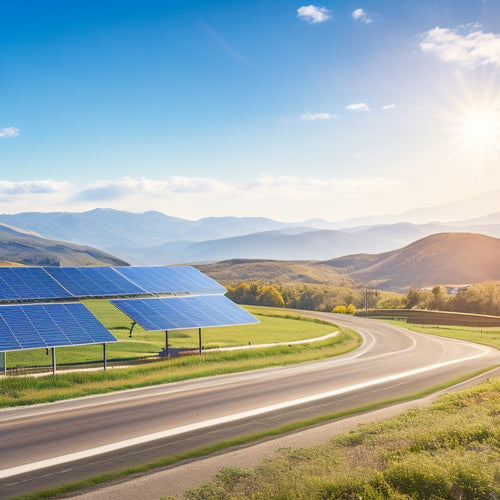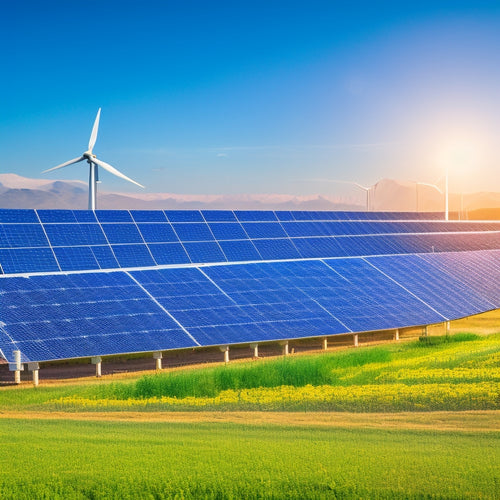
Backup Your Home With Energy Storage Systems
Share
By integrating an energy storage system into your home, you can guarantee a reliable backup power source during outages and markedly reduce your reliance on the grid, while also saving on electricity bills and contributing to a more sustainable future. These systems store excess energy generated by renewable sources, allowing you to use it during peak demand or outages. With various energy storage types, such as lithium-ion and lead-acid batteries, you can choose the best fit for your needs. As you investigate energy storage options, you'll reveal how to optimize your system's performance, from choosing the right battery size to understanding cost savings and incentives, and access a more energy-independent lifestyle.
Overview
- Energy storage systems provide backup power during outages, enhancing grid resiliency and reducing reliance on the grid.
- Lithium-ion batteries are a popular choice for residential use due to their high energy density and long lifespan.
- Calculating power requirement and desired backup duration helps determine the right battery size for your home.
- Top brands like Tesla, LG Chem, and Sonnen offer high-quality batteries with long lifetimes, ensuring a reliable investment.
- Federal tax credits, state rebates, and net metering can help offset the cost of energy storage systems, making them a more affordable option.
Benefits of Home Energy Storage
Three key advantages of home energy storage systems are reduced electricity bills, increased energy independence, and enhanced grid resiliency.
By storing excess energy generated by your solar panels or wind turbines during the day, and using it at night or during power outages, you'll enjoy significant savings on your electricity bills.
With energy independence, you're no longer reliant on the grid, giving you the freedom to manage your energy usage as you see fit.
Additionally, energy storage systems reduce your environmental impact by decreasing your reliance on fossil fuels.
By investing in a home energy storage system, you're not only saving money, but also contributing to a cleaner, more sustainable future.
Furthermore, Energy Independence and Grid Independence allows homeowners to have control over their energy usage and costs, leading to stable bills and informed decisions about consumption.
Home batteries also store excess energy from solar panels or the grid during off-peak hours, optimizing energy efficiency.
How Energy Storage Systems Work
You're about to learn how energy storage systems work. First, you'll need to understand how the system is charged, which typically happens when your home's renewable energy source, like solar panels, generates more power than you're currently using.
During this process, it's crucial to take into account factors like depth of discharge and cycle life to guarantee the efficiency and longevity of your energy storage system.
From there, the stored energy can power your home when it's needed, and the type of energy storage you use will impact how this process unfolds.
Charging the System
A typical energy storage system's charging process begins with an external power source, such as a solar panel or wind turbine, generating electricity. This electricity is then directed to a charge controller, which regulates the flow of energy to your battery bank.
The charge controller guarantees that your batteries are charged safely and efficiently, using optimized charging methods to maximize battery efficiency. For homeowners aiming to reduce grid reliance and enhance energy efficiency, deep cycle batteries are a popular choice, offering high cycle life expectancy for repeated use.
By leveraging these solutions, you can guarantee off-grid reliability and store excess daytime energy for nighttime usage, maximizing renewable energy benefits. You can choose from various charging methods, such as constant current or constant voltage charging, depending on your system's specific needs.
Powering Your Home
With your batteries fully charged, the energy storage system is now ready to power your home. You can now experience the freedom of grid independence, relying on your stored energy to meet your power needs.
The system seamlessly integrates with your solar panels, optimizing solar integration to maximize energy harvesting and reduce your reliance on the grid. When the grid goes down, your energy storage system kicks in, providing a reliable and efficient source of power.
You can monitor and control your energy usage in real-time, making adjustments as needed to guarantee a steady supply of power. With your energy storage system, you're in control, enjoying the peace of mind that comes with having a reliable backup power source.
Energy Storage Types
How do energy storage systems work, and what types of energy storage are available?
You have several options to choose from, each with its own advantages and disadvantages.
Lithium-ion batteries, popular for their high energy density and long lifespan, are a common choice.
Lead-acid batteries, though heavier and less efficient, are more affordable.
Flow batteries, like vanadium redox batteries, store energy in liquid electrolytes, offering scalable and flexible energy storage.
Nickel-cadmium batteries, though toxic, provide reliable performance.
Saltwater solutions, like Aquion's Aqueous Hybrid Ion, offer a non-toxic, environmentally friendly option.
Thermal storage systems, which store energy as heat or cold, and compressed air energy storage systems, which store energy by compressing air, are also viable alternatives.
You can mix and match these options to create a customized energy storage system that suits your needs.
Choosing the Right Battery Size
Since your energy storage system's performance hinges on its battery size, selecting the right capacity is crucial to guarantee you meet your power needs efficiently.
To determine the ideal battery capacity, you'll need to calculate your power requirements during an outage. Consider the essential appliances you want to back up, such as refrigerators, lights, and medical equipment. Add up their wattage to determine your total power load.
Next, consider how long you want the battery to last during an outage. A larger battery capacity will provide more backup time, but it'll also increase the system's cost and size.
Top Brands for Home Batteries
Reliability is key when it comes to energy storage systems, and choosing the right brand for your home battery is crucial.
You'll want a brand that offers high-quality products, efficient energy storage, and dependable performance. When researching top brands, evaluate brand comparisons and user reviews to get a sense of each brand's strengths and weaknesses.
Some top brands to evaluate include Tesla, LG Chem, and Sonnen. These brands offer a range of battery sizes and configurations to fit your energy needs.
Look for brands with high-capacity batteries, long lifetimes, and efficient charging and discharging capabilities. By choosing a reputable brand, you can ascertain your energy storage system provides dependable backup power for your home.
Installation and Maintenance Tips
When you're ready to install your energy storage system, it's essential to guarantee a smooth and safe process.
You'll want to verify your installer follows strict safety protocols to prevent electrical shock, fire hazards, and other risks.
Be sure to discuss the installation timeline with your installer, including the expected duration, milestones, and any necessary permits or inspections.
During installation, your installer should also provide you with clear instructions on how to operate and maintain your system.
Post-installation, schedule regular maintenance checks to verify your system operates at peak performance and identify any potential issues before they become major problems.
Cost Savings and Incentives
As you begin to enjoy the benefits of your newly installed energy storage system, you'll want to maximize your cost savings and take advantage of available incentives. A thorough cost analysis will help you understand the financial benefits of your system.
| Incentive | Description |
|---|---|
| Federal Tax Credit | 26% of total system cost |
| State Rebates | Varies by state, up to $1,000 |
| Net Metering | Offset electricity costs with excess energy |
Frequently Asked Questions
Can I Use Energy Storage Systems With My Existing Solar Panels?
You can integrate energy storage systems with your existing solar panels, enhancing solar panel integration and maximizing energy efficiency benefits, allowing you to store excess energy and enjoy greater freedom from grid dependence.
Will Energy Storage Systems Work During a Grid Outage at Night?
Like a flashlight in the dark, energy storage systems shine during nighttime grid outages, providing reliable power when you need it most. You'll enjoy seamless grid reliability, as your system automatically switches to nighttime usage, ensuring your freedom from grid dependence.
Are Energy Storage Systems Safe for Homes With Children and Pets?
You guarantee child safety and take pet precautions by installing energy storage systems with protective casings, secure mounting, and automatic shutdown features, providing a safe and reliable energy solution for your home.
Can I Monitor My Energy Storage System Remotely?
You can monitor your energy storage system remotely, accessing real-time data on energy production and consumption through mobile apps or web platforms, giving you control over energy management and optimizing your energy independence.
Are Energy Storage Systems Compatible With My Home's Electrical System?
You'll need to guarantee your energy storage system meets your home's installation requirements, considering factors like energy capacity, voltage, and amperage, to guarantee seamless integration with your electrical system, granting you the freedom to utilize and store energy efficiently.
Ready to Buy
You've made it to the end of this article, and you're probably thinking, "Energy storage systems? That's so 21st century!" But the irony is, you might be stuck in the dark ages without one. With the grid becoming increasingly unreliable, it's time to take matters into your own hands. By investing in a home energy storage system, you'll be the one shining bright while your neighbors are left in the dark. So, what are you waiting for? Backup your home, and take control of your energy future.
Related Posts
-

Is Switching to Green Energy Solutions Easy
Switching to green energy solutions isn't just easy; it's also beneficial. You can greatly cut utility costs and enjo...
-

The Role of Battery Monitoring Systems in Renewable Energy
Battery monitoring systems play an essential role in renewable energy by enhancing system longevity and optimizing pe...
-

High-Efficiency Solar Battery Chargers for Remote Areas
High-efficiency solar battery chargers are essential for your off-grid energy needs in remote areas. They maximize en...


